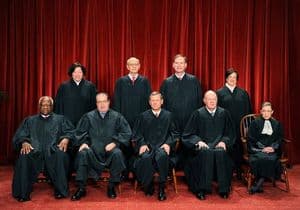As Towleroad has reported, the justices of the U.S. Supreme Court will meet in private tomorrow – January 9 – to consider, among other things, whether to grant a hearing in the marriage equality cases out of the Sixth Circuit and Louisiana. If you recall, the Sixth Circuit decided in November to uphold bans on the freedom to marry in an opinion that is word-for-word out of the conservative movement's playbook.
Although we cannot be sure that the Court will decide to take the case at this particular meeting — there are many cases on the docket and there is a limit to how long the justices will sit there — there is a strong likelihood that the Court will ultimately hear the case and decide, finally, that bans on gay marriage are unconstitutional.
There are several factors suggesting the Court will take the Sixth Circuit cases:
CONTINUED, AFTER THE JUMP…
2. The Sixth Circuit is the only appellate court to approve of a state ban on same-sex marriage in the post-Windsor landscape. As such, it has created a split among the circuits, since the Fourth, Seventh, Ninth, and Tenth Circuits have all declared bans in their jurisdictions unconstitutional. Circuit splits may not be the only reason why the Supreme Court takes cases; nor must the Court take cases in these situations. However, it is certainly a powerful and common motivating force for the Court to act.
3. The Court's refusal to hear cases from the Fourth, Seventh, and Tenth Circuits appears to be based on the fact that the Court did not have to intervene. When those cases were before the Court, all lower courts agreed, and ostensibly agreed with where the Supreme Court was headed. Now, the situation is different.
There are also several factors that counsel in favor of a conclusion that the Supreme Court will ultimately decide in favor of marriage equality.
1. It allowed pro-equality decisions to stand in the Fourth, Seventh, and Tenth Circuits, and it is highly unlikely that the Court would ultimately go back on its tip of the hand.
2. The Court recently refused to grant a stay in the Florida marriage case, bringing marriage equality to a state in a jurisdiction without a pro-equality appellate court ruling. This is an even stronger signal of where the Court is heading.
3. As of today, marriage equality has come to 35 states and the District of Columbia. By a wide margin, more Americans live in marriage equality states than not. Polls show that support for marriage equality is rising, and especially rising in states with pro-equality court decisions. This reflects what former Justice Sandra Day O'Connor called an "emerging consensus" among the American people and the courts. Though the Supreme Court does not always follow public opinion, this consensus makes it less likely that the Court will defy the will of the country on an issue where, among the younger generations, the consensus has already emerged.
***
Follow me on Twitter and on Facebook.
Ari Ezra Waldman is a professor of law and the Director of the Institute for Information Law and Policy at New York Law School and is concurrently getting his PhD at Columbia University in New York City. He is a 2002 graduate of Harvard College and a 2005 graduate of Harvard Law School. Ari writes weekly posts on law and various LGBT issues.




